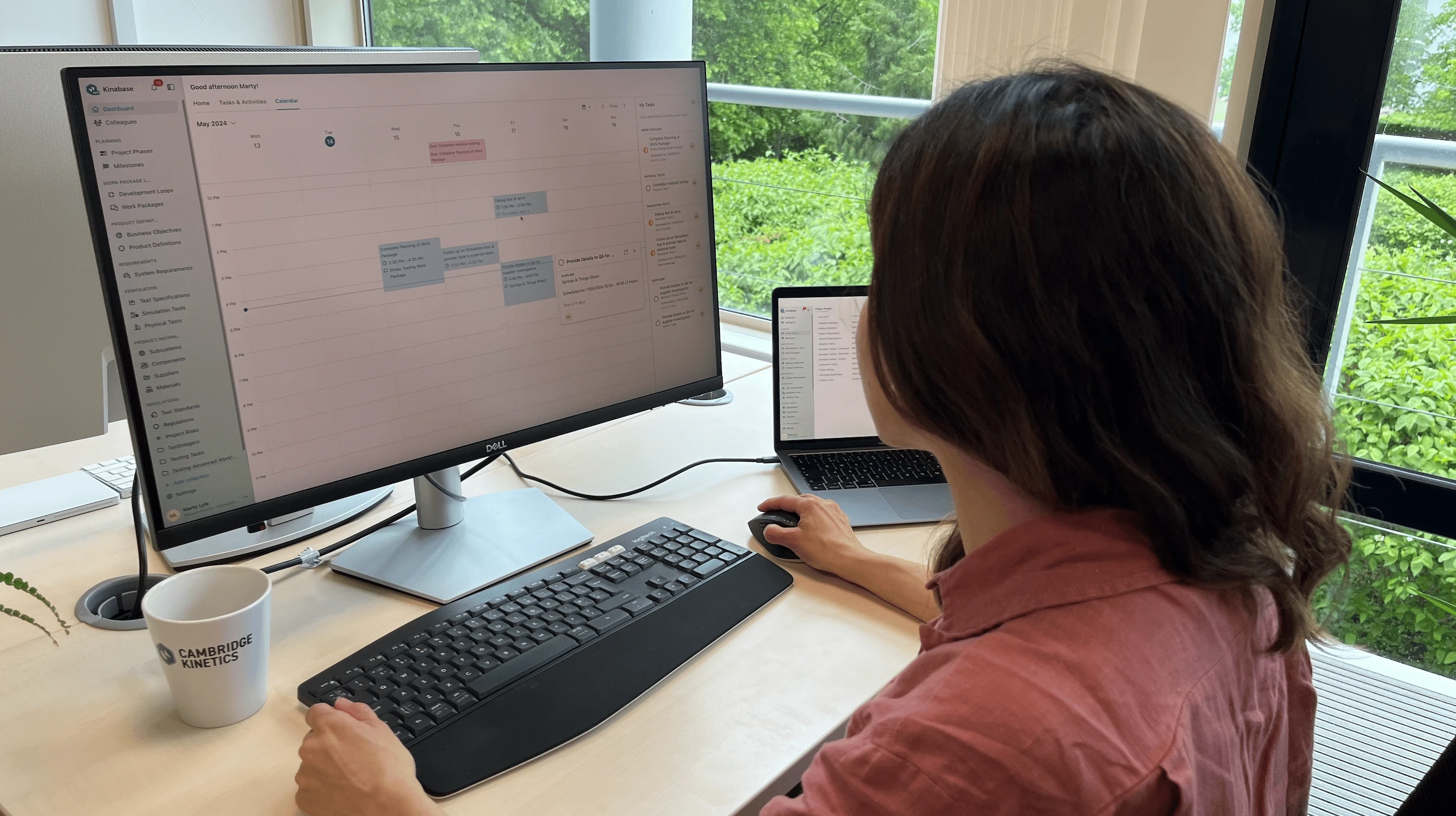
Optimise Your Day with Time-Blocking Techniques
Imagine having a superpower at work — one that lets you block time and work efficiently, allowing you to focus on the enjoyable aspects of your job. By implementing a few simple techniques in your daily routine, you can make your workday significantly more productive.
This technique is known as time blocking.
What Is Time Blocking?
Time blocking is a time management strategy that involves allocating specific periods of time in your day to distinct tasks, from physical exercise to checking email, client calls to picking up kids from school, and everything in between. Time blocking means you can schedule out every part of your day and know what exactly you’ll be doing and where your focus needs to be for that time block.
We know how busy life and work can get, so having a system that helps you fit all your necessary tasks and activities in your day can help you feel more balanced. You can confidently give 100% of your attention to the task at hand, knowing that you have made time to do everything you need to for that day. Essentially, time blocking combines the humble checklist with the robust calendar and helps you manage your time effectively to accomplish all your tasks. And, if you don’t finish something within your time block, you can always rearrange your schedule to accommodate it, or create another time block for the next day to finish it up.
Time blocking helps you minimise distractions, stay organised, and balance work and personal life. You’ll be able to understand where your time is actually going, which can help you adjust your focus on what really matters, eliminating stress and burnout. According to a 2020 survey by Qualtrics, 79% of employees across 26 countries felt they were “at or beyond workload capacity.” Further, a 2022 survey by McKinsey Health identified 25% of employees across 12 countries as experiencing symptoms of burnout at work. Burnout can happen to anyone, in any industry, and it has become increasingly common. Time blocking can not only help alleviate stress and burnout by allocating time to each of your important tasks, but also make sure you’re creating time to recharge and take care of yourself.
Below are some best practices for time blocking your day to help you get started.
Strategies for Effective Time Blocking
1. Understand your task priorities by keep your projects up to date
Start your day by identifying your most important tasks, so you know you are spending your time wisely. Even before you start planning your future tasks, try to understand your current workload. Review your project lists, meeting agendas, and any outstanding deadlines. Use a project management tool or a simple list to identify the most critical tasks for each project. Ask yourself: What absolutely needs to get done this week? What tasks will move the needle forward for your team or projects? Once you have a clear understanding of your priorities, you can allocate bigger time blocks in your schedule for the most crucial tasks.
For example, the Kinabase dashboard provides a clear visual overview of your tasks and priorities, allowing you to quickly organise your agenda and plan time for each task across your day, week, or month. Since it integrates with the tasks already assigned to you in the Kinabase software, you can rely on your Kinabase calendar dashboard as the source of truth for your organisation’s priorities.
2. Group similar tasks
Another great technique is grouping. When you cluster similar tasks together you can be more efficient. Multitasking might feel efficient, but it hinders focus and slows you down. By grouping similar tasks together, you can leverage your focus and minimise distractions. This is because your brain doesn't have to constantly switch gears between different types of work. For instance, dedicate a time block in the morning to respond to all your emails. Schedule another block for phone calls in the afternoon, when you might have more energy for conversation. For longer stretches of focused work, like writing or analysis, block out uninterrupted time slots in the quietest part of your day.
Grouping tasks also helps you feel accomplished with what you’ve done. Knowing that you knocked out all your customer requests, responded to all the relevant emails in your inbox, or finished a project milestone in one fell swoop can lift your spirits and help you stay productive longer. All due to time blocking.
3. Break down larger tasks
Large, looming projects can feel paralysing and can cause procrastination and delays. You can combat this by separating your large projects or deadlines into smaller, more manageable steps.
Start by outlining the main deliverables and milestones for a given project. Then, for each milestone, identify the specific tasks that need to be completed. Schedule dedicated time blocks throughout the day, week, and month for each sub-task and estimate how long each will take. This will make the project feel less overwhelming and help you stay on track. You’ll also have the peace of mind that you’ve allocated time to work on important parts of the project over a specified period.
Tools like mind maps or task management software can be helpful for visualising and organising your tasks. Kinabase can specifically help you break down your projects to become more manageable; it can help you create tasks for yourself or others as well as activities within each task. You can also utilise the activity timeline to understand the history of interactions within a task and see who has contributed to it.
4. Set aside “no-distractions” time
During your designated work blocks, silence your notifications and minimise distractions. This is where creating a dedicated workspace comes in handy. If possible, find a quiet room where you can close the door and focus on the task at hand. Let colleagues know you'll be unavailable for a specific period on your calendar or use tools like "Do Not Disturb" on your messaging apps. If interruptions are unavoidable, consider using the Pomodoro Technique: work in focused 25-minute intervals with short breaks in between. This method allows you to maintain concentration while still giving your mind a chance to recharge.
Researcher Cal Newport calls this phenomenon “Deep Work,” and named a book after the same phrase. In it, he proposes that thinking deeply and having focused, uninterrupted time to be productive “is becoming increasingly valuable at the same time that it’s becoming increasingly rare.” If you can cultivate the habit of working deeply by training your brain to focus on what’s important rather than complete shallow, mindless tasks, you will not only be ahead of the competition, but also find true meaning and fulfillment in your work.
Conclusion
Time blocking is not just a nice technique to be more efficient at work. Using your time strategically can improve not just your personal productivity, but also your focus, work-life balance, and stress levels. By implementing these strategies to become more time-rich, you'll find yourself more organised and energised at work. Use your time wisely and it can become your superpower!
Sources
- Cirillo, F. “The Pomodoro Technique, About.” https://www.pomodorotechnique.com/
- Newport, C. (2015). Deep Work: Rules for Focused Success in a Distracted World. Grand Central Publishing.
- McKinsey Health, (2022). “Addressing employee burnout: Are you solving the right problem?” https://www.mckinsey.com/mhi/our-insights/addressing-employee-burnout-are-you-solving-the-right-problem
- Qualtrics, (2020). “2020 Global Workforce Resilience Report.” https://www.qualtrics.com/research-center/employee-resilience-research/
Recent Articles

Sleigh Bells and Stock Levels: How a Single Source of Truth Streamlines
Turn seasonal pressure into a plan for durable, data-led advantage for a smoother transition into a smarter Q1.

Data Without the Headache: AI-Powered Insights for Decision-Makers
How AI Reduces Complexity and Enables Smarter, Faster Decisions .

Customising Your Digital System for Long-Term Growth
Utilising the flexibility of Kinabase to track and evolve with business needs.